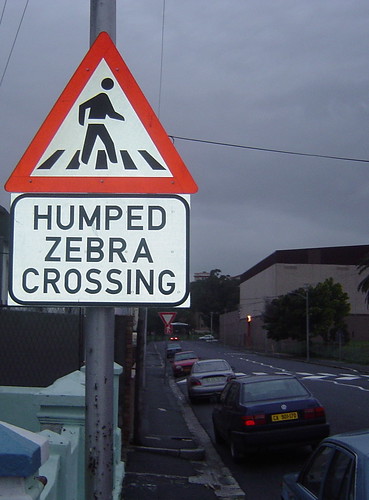Thursday, June 30, 2005
Our Newsday friends will recognize the author of this article, which appeared in South Africa's Sunday Times last weekend.
Monday, June 27, 2005
More Cannibalism
The Daily Voice had yet another disturbing front page recently.
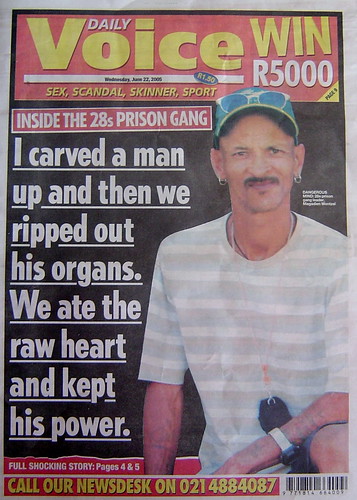
If you can believe it, the story inside was rather mediocre. So, if you're looking for more from Cape Town's tabloid this week, you can take a peek at this gallery of previous headlines I've shared on this site.
Admit it. This little weekly feature is the reason you get out of bed on Monday morning.

If you can believe it, the story inside was rather mediocre. So, if you're looking for more from Cape Town's tabloid this week, you can take a peek at this gallery of previous headlines I've shared on this site.
Admit it. This little weekly feature is the reason you get out of bed on Monday morning.
Friday, June 24, 2005
At the Coffee Shop
The corporate behemoth that invented the $5 coffee, Starbucks, hasn't come to Cape Town yet. I'm pretty sure it hasn't set up shop anywhere in South Africa. But there's something called the Seattle Coffee Company that's in several of the more upscale malls.
Seattle, as it's called, has coffee and espresso drinks that are pretty close to the Starbucks ideal, though they still can cost upwards of $3 in a country where the median income is something like 100 rand, or $15, a day.
I've talked to several people from Cape Town who had no idea that it wasn't an American company. But a little research shows that South Africans founded it, though some big multi-national may own it now.
Since people here think it's not local, it must have a menu, a decor and an attitude that seem un-South African… unlike, say, the Mombassa Café at the other end of the mall.
And largely, Seattle's would seem oddly familiar to anyone from the states who showed up there looking to satisfy their tall-iced-mocha-jones. They've got it all, from the biscotti to the couches to the earnest, piped-in music to the odd claims about how their coffee beans are fed spring water, grow only in the shade and only on west facing slopes, and are picked only in the mornings by extremely well paid, well trained and well washed virgins. Or something.
They also have a coffee glossary on the wall to help explain coffee terminology, and when you order, they insist on repeating your order back to you in their weird jargon that doesn’t sound like anything I've ever heard in the states. I mean, "with wings" ? Is that familiar to anyone? It means to go. Or "fun" instead of foam? I dunno. I was never up to speed on my coffee talk.
The oddest part about the Seattle Coffee Company is the weird posters they have on the wall that wax lyrical about Seattle--both the shop and the city. I think. I mean, it's hard to tell what they're really on about.
As Exhibit A, I give you this poem, which I copied into the laptop when I was supposed to be writing about wine. It was plastered in massive type on a poster next to the cash register. I assure you, there are no transcription errors:
For me, this is a
Sacred point in time
I drank from her cup her sweet fragrance
Lingered on its lip mellowing the coffee &
Smoothing its edge, a dreamy combination
Which invaded my senses.
Pause;
Seattle. I found my
dreams. In Seattle.
I found my life. In
Seattle. I found myself.
Continue.
Seattle, as it's called, has coffee and espresso drinks that are pretty close to the Starbucks ideal, though they still can cost upwards of $3 in a country where the median income is something like 100 rand, or $15, a day.
I've talked to several people from Cape Town who had no idea that it wasn't an American company. But a little research shows that South Africans founded it, though some big multi-national may own it now.
Since people here think it's not local, it must have a menu, a decor and an attitude that seem un-South African… unlike, say, the Mombassa Café at the other end of the mall.
And largely, Seattle's would seem oddly familiar to anyone from the states who showed up there looking to satisfy their tall-iced-mocha-jones. They've got it all, from the biscotti to the couches to the earnest, piped-in music to the odd claims about how their coffee beans are fed spring water, grow only in the shade and only on west facing slopes, and are picked only in the mornings by extremely well paid, well trained and well washed virgins. Or something.
They also have a coffee glossary on the wall to help explain coffee terminology, and when you order, they insist on repeating your order back to you in their weird jargon that doesn’t sound like anything I've ever heard in the states. I mean, "with wings" ? Is that familiar to anyone? It means to go. Or "fun" instead of foam? I dunno. I was never up to speed on my coffee talk.
The oddest part about the Seattle Coffee Company is the weird posters they have on the wall that wax lyrical about Seattle--both the shop and the city. I think. I mean, it's hard to tell what they're really on about.
As Exhibit A, I give you this poem, which I copied into the laptop when I was supposed to be writing about wine. It was plastered in massive type on a poster next to the cash register. I assure you, there are no transcription errors:
For me, this is a
Sacred point in time
I drank from her cup her sweet fragrance
Lingered on its lip mellowing the coffee &
Smoothing its edge, a dreamy combination
Which invaded my senses.
Pause;
Seattle. I found my
dreams. In Seattle.
I found my life. In
Seattle. I found myself.
Continue.
Thursday, June 23, 2005
Shutterbuggin'
We finally, FINALLY got the bastards at the phone company to give us DSL. And that means I've loaded a few sets of pictures that we were keeping in reserve for this very moment. Putting them online before now, with a very slow dial-up internet connection, would have been torture.
And since we were paying for internet on a per minute basis with dial-up, it also would have been expensive.
In any case, they are up now. There's pictures from a protest identical to the one that I mentioned in an earlier post here. The are just a few from a couple trips we made to the township of Khayelitsha here. And our extensive collection of pictures from our numerous trips to the wine country is here.
Having DSL makes me want to dance. Like this...
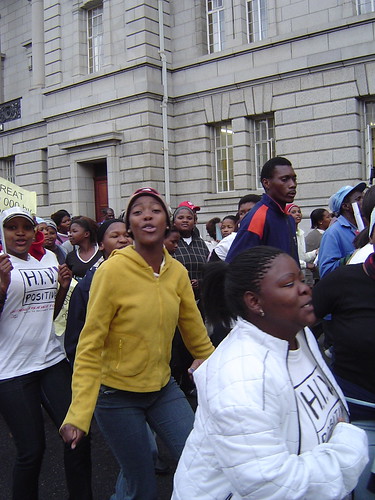
And since we were paying for internet on a per minute basis with dial-up, it also would have been expensive.
In any case, they are up now. There's pictures from a protest identical to the one that I mentioned in an earlier post here. The are just a few from a couple trips we made to the township of Khayelitsha here. And our extensive collection of pictures from our numerous trips to the wine country is here.
Having DSL makes me want to dance. Like this...

Monday, June 20, 2005
A Bite Too Far
It's Monday, and that means it's time for more from the Daily Voice, the local tabloid around these parts. Past articles that I've put up on this site have been by varying degrees hilarious, or offensive, or just plain strange.
But the one that follows is simply disgusting. It's so over the top, I'm including it even though it looks like it was rewritten from wire copy. The headline from it was "A Bite Too Far."
A man died after choking on the flesh of his common-law wife's corpse.
The couple's two children apparently watched while their father afte the flesh off their dead mother's face on Friday morning.
Police spokesman Captain Tienkie van Vuuren said police were called to Thembalethu Village near Mkuze in the Tugela Ferry area at 3 a.m. on Friday after a 13-year-old girl ran to her neighbours for help.
She said when they arrived at the scene they had to force their way inside the house to rescue the other girl, 7, who had also been stabbed in the head by the father.
"Inside, police found the naked Jubulani Siphethu sitting on top of his common-law wife's body eating the flesh from her face," said van Vuuren.
"Only the forehead was still intact. The bone was visible where the rest of the face used to be."
Siphethu was very aggressive during the arrest and threatened police with a knife. He was eventually apprehended and taken outside.
"There, he suddenly choked and became unconscious and died.
"The seven-year-old girl was removed from the scene by ambulance together with her older sister who escaped unharmed," said van Vuuren.
She said a case of murder had been opened…
More articles on this same story--some from actual reputable sources--can be found here.
But the one that follows is simply disgusting. It's so over the top, I'm including it even though it looks like it was rewritten from wire copy. The headline from it was "A Bite Too Far."
A man died after choking on the flesh of his common-law wife's corpse.
The couple's two children apparently watched while their father afte the flesh off their dead mother's face on Friday morning.
Police spokesman Captain Tienkie van Vuuren said police were called to Thembalethu Village near Mkuze in the Tugela Ferry area at 3 a.m. on Friday after a 13-year-old girl ran to her neighbours for help.
She said when they arrived at the scene they had to force their way inside the house to rescue the other girl, 7, who had also been stabbed in the head by the father.
"Inside, police found the naked Jubulani Siphethu sitting on top of his common-law wife's body eating the flesh from her face," said van Vuuren.
"Only the forehead was still intact. The bone was visible where the rest of the face used to be."
Siphethu was very aggressive during the arrest and threatened police with a knife. He was eventually apprehended and taken outside.
"There, he suddenly choked and became unconscious and died.
"The seven-year-old girl was removed from the scene by ambulance together with her older sister who escaped unharmed," said van Vuuren.
She said a case of murder had been opened…
More articles on this same story--some from actual reputable sources--can be found here.
Sunday, June 19, 2005
Youth Day, Part II
So Youth Day, mentioned in my last post, commemorates something quite serious and quite notable in South Africa's recent history, and I feel like a bit of a cad for spouting off about it last week--if only just a little--before finding out what it was.
It seems that Youth Day commemorates the 1976 Soweto Uprising, and June 16 is the anniversary of the death of hundreds of South Africans, including a 12 year-old-boy named Hector Pieterson. Hector was shot by police when they opened fire on a group of protesting students. They were demonstrating against a new mandate that all school instruction from that day on was supposed to be given in Afrikaans, the language of the architects of apartheid. By one count, 566 people died that day. Many children never went back to a public school after the start of the uprising. Under the apartheid government, the day stood as a symbol of resistance to the brutality of the government, and now it's a day when South Africa seeks to bring attention to the needs of young people.
When I heard that, I immediately shelved my plan to make light of it some more in this space. My planned meditation on how anything called Youth Day might be celebrated in the United States (hint: it involved Botox, liposuction, and hair plugs) will never see the light of day. Neither will the jokes involving Michael Jackson. Now, it all seems so wrong.
It seems that Youth Day commemorates the 1976 Soweto Uprising, and June 16 is the anniversary of the death of hundreds of South Africans, including a 12 year-old-boy named Hector Pieterson. Hector was shot by police when they opened fire on a group of protesting students. They were demonstrating against a new mandate that all school instruction from that day on was supposed to be given in Afrikaans, the language of the architects of apartheid. By one count, 566 people died that day. Many children never went back to a public school after the start of the uprising. Under the apartheid government, the day stood as a symbol of resistance to the brutality of the government, and now it's a day when South Africa seeks to bring attention to the needs of young people.
When I heard that, I immediately shelved my plan to make light of it some more in this space. My planned meditation on how anything called Youth Day might be celebrated in the United States (hint: it involved Botox, liposuction, and hair plugs) will never see the light of day. Neither will the jokes involving Michael Jackson. Now, it all seems so wrong.
Thursday, June 16, 2005
Happy Youth Day
Today is Youth Day in South Africa.
Katie and I have no idea what Youth Day is about, or what it means, or, most importantly, if anything will be open.
We will investigate all of those matters and report back to you. In the meantime... Happy Youth Day.
Katie and I have no idea what Youth Day is about, or what it means, or, most importantly, if anything will be open.
We will investigate all of those matters and report back to you. In the meantime... Happy Youth Day.
Home Affairs
In an alternate universe, one in which I didn't get my visa, I left South Africa today.
Today was the day my original tourist visa was going to expire, and it took all my energy, all my composure, a lot of my money and a whole bunch of jumping through ever-more-ridiculous hoops to get a temporary residence permit that allows me to stay for the entire time Katie's going to be getting her masters.
Now that I have that little sticker in my passport, the story of what it took to get it must be told.
Or it could be told, except that it's very long and very boring, and would involve interminable paragraphs where I bemoan the fact that I spent interminable afternoons waiting in South Africa's version of the INS office. They call it Home Affairs.
But the story of inept bureaucracy is the same all over the world. I've been assured--by people who have been to both--that the local U.S. consulate here is just as annoying, only with the added hassle of having amazingly imaginative security guards who view every personal effect you could ever want to carry on your person as a direct threat to the United States of America. God help you if you try to bring your chap stick when you're applying for a green card.
So, to avoid the long and boring story, I'll skip right on ahead to my sixth visit (of seven) to the office, about a month ago, which was when my personal tale of woe veered briefly from the rather pedestrian to the downright absurd.
By this point, I had already officially submitted my application, but was returning to pay a deposit that is ostensibly supposed to be money that you will later use for your plane ticket when you leave the country. Since I had pretty much jumped through all their silly hoops, I was eyeing with pity all the other sad sacks who were standing in disbelief at the counter. They were appalled at the way they were being treated by the Home Affairs staff, and appalled at the odd requirements that emerge, one by one, on each return trip.
For example, did you know that, in order to get the type of temporary residence permit I wanted, you need to have a South African chartered accountant review your finances? That's in the application's paperwork; it shouldn't be a surprise. But even the accountant I found to do this didn't know that he had to include one very specific sentence, phrased just so, or else I'd get sent packing. I was quite proud of my accountant's letter, when he and I finally got it right.
So was the Department of Home Affairs, apparently. That day that I was there to pay the deposit, I noticed one of my fellow foreigners looking particularly dejected as he read a piece of paper on the counter. Then I noticed that whatever he was reading, it was from the same accountancy firm I had used. I knew that if I scooted over just so, and leaned far enough, and looked in the right place, I could see this guy's entire net worth.
I'm a curious person. So I scooted, and leaned, and looked.
And saw my own letter. The Home Affairs lackeys were handing it out as an example of what a letter from a chartered accountant should say.
It didn't have my address, or my social security number, or any identifying information other than my name, but it did have a rather large (to me, anyway) dollar figure. And they were apparently handing these out like candy to whoever strolled in off the street and asked about a temporary residence permit.
What does one do in this situation? Does one throw a huge fit? If one is just weeks from having their yearlong siesta cut nine months short, and one is facing the very people who will decide if one qualifies to extend one's stay, one does not. One simply grits one's teeth, walks away, and resolves to write scathing things on one's web site, which no one reads.
Then, one quotes from Dark Star Safari, a fantastic and acerbic book by Paul Theroux, in which he travels overland (mostly) from Cairo to Cape Town.
You could not spend a more wasted day than in an office of the Tanzanian government, as I discovered in Dar Es Salaam ... Tanzanians complained of unemployment--in the capital almost half the adults had no jobs. But those with jobs did next to nothing, if the Office of Immigration was anything to go by. I had my passport, my fifty U.S. dollars in cash, my filled-out application for a tourist visa, and I stood the requisite hour in line. I was no one special. Everyone else in line was encountering the same obstacles in the open-plan office of twenty employees: apathy, then rudeness, and finally hostility.
The crowd I was among just watched and waited. The office was dirty, the desks messy: one civil servant was eating a hunk of cake; another one, a woman with curlers in her hair, was reading the morning paper at her desk; yet another, a man, simply stared into space, drumming his fingers. I tried to detach my personal urgency from the charade... and watched as though it were a comic documentary. "You come back later," a surly woman said. But I wanted to monitor my application as it proceeded through all the stages, moving from desk to desk, getting cake crumbs on it from the gobbling man, tea stains from the fingers of the cup sipper. Six people examined and initialed my form. And then it was put in a tray, where it remained for twenty minutes. It was then handed through a slot in the wall, a side office...
Following my passport, I sneaked over to the side office door and opened it, apologizing-pretending to have entered the wrong office-and saw the visa officer in a white shirt and blue necktie with a tin tray on his desk, a hunk of bread in his hand, tucking into a big bowl of meat stew, slopping gobs of gravy on the stack of visa forms.
"Sorry," I said, and hurried outside to laugh.
There I found Christopher Njau. He was twenty-two, university educated, unemployed, trying to get a passport...
"I want to leave," he said. "That's why I am here. I need a passport to leave--but already it has been months."
"Where would you like to go?"
"My sister is in Texas. She is studying. She has her own car! With a car she can drive to work and also study."
He shook his head in disbelief. It seemed almost unimaginable that his sister, a woman of twenty-four, would own a car. I found it much harder to imagine that she had actually been to this office and gotten a passport.
Today was the day my original tourist visa was going to expire, and it took all my energy, all my composure, a lot of my money and a whole bunch of jumping through ever-more-ridiculous hoops to get a temporary residence permit that allows me to stay for the entire time Katie's going to be getting her masters.
Now that I have that little sticker in my passport, the story of what it took to get it must be told.
Or it could be told, except that it's very long and very boring, and would involve interminable paragraphs where I bemoan the fact that I spent interminable afternoons waiting in South Africa's version of the INS office. They call it Home Affairs.
But the story of inept bureaucracy is the same all over the world. I've been assured--by people who have been to both--that the local U.S. consulate here is just as annoying, only with the added hassle of having amazingly imaginative security guards who view every personal effect you could ever want to carry on your person as a direct threat to the United States of America. God help you if you try to bring your chap stick when you're applying for a green card.
So, to avoid the long and boring story, I'll skip right on ahead to my sixth visit (of seven) to the office, about a month ago, which was when my personal tale of woe veered briefly from the rather pedestrian to the downright absurd.
By this point, I had already officially submitted my application, but was returning to pay a deposit that is ostensibly supposed to be money that you will later use for your plane ticket when you leave the country. Since I had pretty much jumped through all their silly hoops, I was eyeing with pity all the other sad sacks who were standing in disbelief at the counter. They were appalled at the way they were being treated by the Home Affairs staff, and appalled at the odd requirements that emerge, one by one, on each return trip.
For example, did you know that, in order to get the type of temporary residence permit I wanted, you need to have a South African chartered accountant review your finances? That's in the application's paperwork; it shouldn't be a surprise. But even the accountant I found to do this didn't know that he had to include one very specific sentence, phrased just so, or else I'd get sent packing. I was quite proud of my accountant's letter, when he and I finally got it right.
So was the Department of Home Affairs, apparently. That day that I was there to pay the deposit, I noticed one of my fellow foreigners looking particularly dejected as he read a piece of paper on the counter. Then I noticed that whatever he was reading, it was from the same accountancy firm I had used. I knew that if I scooted over just so, and leaned far enough, and looked in the right place, I could see this guy's entire net worth.
I'm a curious person. So I scooted, and leaned, and looked.
And saw my own letter. The Home Affairs lackeys were handing it out as an example of what a letter from a chartered accountant should say.
It didn't have my address, or my social security number, or any identifying information other than my name, but it did have a rather large (to me, anyway) dollar figure. And they were apparently handing these out like candy to whoever strolled in off the street and asked about a temporary residence permit.
What does one do in this situation? Does one throw a huge fit? If one is just weeks from having their yearlong siesta cut nine months short, and one is facing the very people who will decide if one qualifies to extend one's stay, one does not. One simply grits one's teeth, walks away, and resolves to write scathing things on one's web site, which no one reads.
Then, one quotes from Dark Star Safari, a fantastic and acerbic book by Paul Theroux, in which he travels overland (mostly) from Cairo to Cape Town.
You could not spend a more wasted day than in an office of the Tanzanian government, as I discovered in Dar Es Salaam ... Tanzanians complained of unemployment--in the capital almost half the adults had no jobs. But those with jobs did next to nothing, if the Office of Immigration was anything to go by. I had my passport, my fifty U.S. dollars in cash, my filled-out application for a tourist visa, and I stood the requisite hour in line. I was no one special. Everyone else in line was encountering the same obstacles in the open-plan office of twenty employees: apathy, then rudeness, and finally hostility.
The crowd I was among just watched and waited. The office was dirty, the desks messy: one civil servant was eating a hunk of cake; another one, a woman with curlers in her hair, was reading the morning paper at her desk; yet another, a man, simply stared into space, drumming his fingers. I tried to detach my personal urgency from the charade... and watched as though it were a comic documentary. "You come back later," a surly woman said. But I wanted to monitor my application as it proceeded through all the stages, moving from desk to desk, getting cake crumbs on it from the gobbling man, tea stains from the fingers of the cup sipper. Six people examined and initialed my form. And then it was put in a tray, where it remained for twenty minutes. It was then handed through a slot in the wall, a side office...
Following my passport, I sneaked over to the side office door and opened it, apologizing-pretending to have entered the wrong office-and saw the visa officer in a white shirt and blue necktie with a tin tray on his desk, a hunk of bread in his hand, tucking into a big bowl of meat stew, slopping gobs of gravy on the stack of visa forms.
"Sorry," I said, and hurried outside to laugh.
There I found Christopher Njau. He was twenty-two, university educated, unemployed, trying to get a passport...
"I want to leave," he said. "That's why I am here. I need a passport to leave--but already it has been months."
"Where would you like to go?"
"My sister is in Texas. She is studying. She has her own car! With a car she can drive to work and also study."
He shook his head in disbelief. It seemed almost unimaginable that his sister, a woman of twenty-four, would own a car. I found it much harder to imagine that she had actually been to this office and gotten a passport.
Wednesday, June 15, 2005
Monday, June 13, 2005
Sharks!


Rascist sharks in the Cape are chomping on whiteys and leaving coloureds and blacks alone.
Yet another white person, Durbanville diver Henri Murray, 22, was killed while spear-fishing this weekend.
A massive Great White Shark emerged from the deep to snatch him. By last night, his body had still not been found; only his car keys in a piece of wetsuit.
His friend, Piet van Niekerk, 23, only escpaed after shooting his spear gun at the massive beast near Miller's Point.
According to Sharks Board statistics there have been more than 70 attacks in Cape waters since 1990.
And the board's head of research Jeremy Cliff recalls that only two of those were people of colour.
These were the laatie surfer JP Andrews, who lost his leg but survived after bring attacked near Muizenberg last April. And Gansbaai poacher Nkosinathi Mayaba was killed off Pearly Beach.
In aother incident Nazri Gasant was spear-fishing with his friend when a shark circled them a few times but did not actually attack.
A National Sea Rescue Institute (NSRI) volunteer points out that several of the victims were not only white but also foreign.
This racial profiling of Great Whites was shown in the movie Jaws IV, in which the shark swallowed white people but spat out the only black person it attacked.
The NSRI volunteer confirms the terrifying beasts, which can be the length of two saloon cars, prefer to eat whites.
"But I think that's just coincidence. It's probably because more white people are board surfers and do spear-fishing," he says.
Other experts speculate that richer white people in expensive wetsuits may resemble seals and be more attractive to hungry sharks.
Cliff says the practice of spear-fishing, with fish bleeding into the water, is likely to attract predators.
"As a spear-fisherman myself...it's risky. It's very attractive to sharks," says Cliff.
Spear-fishing means going deeper in than wave riders and that means you are at greater risk of being spotted by a shark.
Cliff says it is impossible to say whether the same shark was responsible for the three attacks last year--on Andrews, Mayaba and Tyna Webb, 77, who was killed by a Great White near Fish Hoek.
Only Tanya's red bathing cap was found after the attack. And she was also one of the few victims who was not wearing a diving suit.
We asked Cliff whether sharks prefer swimmers in wetsuits.
He says those who stay in longer are more likley to be bitten.
Murray was apparently attacked some 200 to 300 metres off Miller's Point around 4 pm.
Rescue craft sent to search for Murray included a Metro Rescue helicopter and an NSRI boat.
It's Monday, so that must have been the best article from the Daily Voice from the past week. Actually, that might have been the best one ever. But, to review, these are the other contenders...
...the "corpse" that awoke from the dead;
...a handicapped man whom the newspaper brutally mocked;
...the witch doctor that townsfolk said was reincarnated as a snake--a snake with glasses;
...a delicate, and much delayed, operation;
...the second coming;
...and the most offensive headline ever.
Oh, and I almost forgot. In that second image at the start of this entry, you can see the sidebar, with the headline, "You Eat Me Then I'll Eat You." It includes recipes for Shark Fin Soup and Shark Biltong.
Yum.
Sunday, June 12, 2005
Taran-too-la
Katie met a man on Friday who wanted to show off his tarantooooola.
It was large and hairy, and Katie wanted none of it. So he moved on to the kids.
They had been looking at butterflies on a class trip, but they soon became enthralled by the sight of this creepy man and his big spider, which he insisted on pronouncing with an odd stress on the third syllable. He was a fool-a with a taran-too-la.
This all happened at Butterfly World in the wine region just outside of Cape Town. Katie and I were there for two days for more "research" for a "travel story." Butterfly World was an early-morning stop, since we got to the wine country at around 9:30 on Friday, which felt a little early to begin the long day of tasting wine.
In fact, we interspersed plenty of wildlife stops in between the wineries.
We saw the butterflies...
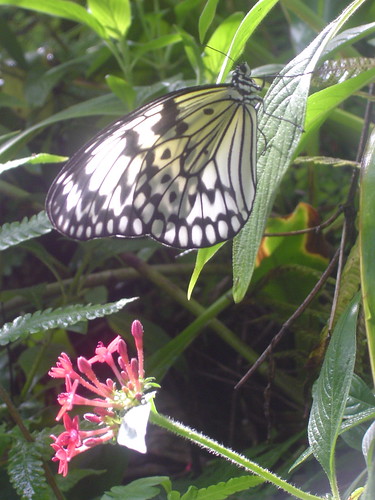
Several marmosets...
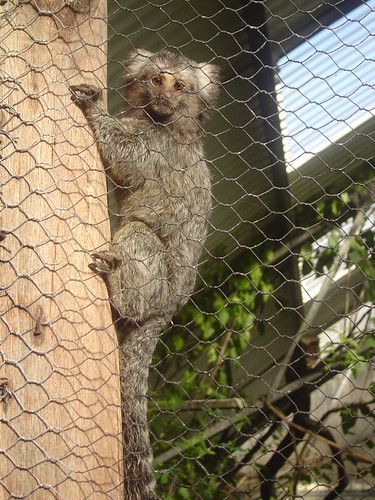
Goats...
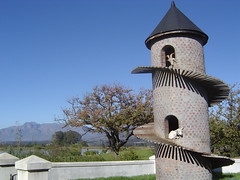
And cheetahs…
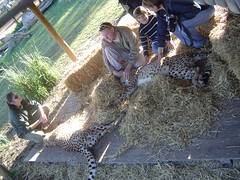
A larger picture of the cheetahs is here. We're limited on the size of our horizontal pictures by the width of the column. The next larger size is way too big.
We also ate some pretty good cheese and wandered into a few very small wineries where the staff in the tasting room was more than willing to talk to us until all our dumb questions about wine were answered. And I didn't even tell them I was a reporter.
It was large and hairy, and Katie wanted none of it. So he moved on to the kids.
They had been looking at butterflies on a class trip, but they soon became enthralled by the sight of this creepy man and his big spider, which he insisted on pronouncing with an odd stress on the third syllable. He was a fool-a with a taran-too-la.
This all happened at Butterfly World in the wine region just outside of Cape Town. Katie and I were there for two days for more "research" for a "travel story." Butterfly World was an early-morning stop, since we got to the wine country at around 9:30 on Friday, which felt a little early to begin the long day of tasting wine.
In fact, we interspersed plenty of wildlife stops in between the wineries.
We saw the butterflies...

Several marmosets...

Goats...

And cheetahs…

A larger picture of the cheetahs is here. We're limited on the size of our horizontal pictures by the width of the column. The next larger size is way too big.
We also ate some pretty good cheese and wandered into a few very small wineries where the staff in the tasting room was more than willing to talk to us until all our dumb questions about wine were answered. And I didn't even tell them I was a reporter.
Wednesday, June 08, 2005
Dodging Rocks
When our friends Rob and Tom were here a couple weeks ago, they had already seen all the rest of South Africa, which (I'm told) is much more African-seeming than here. We've mentioned this before, and mentioned that we're a little self-conscious about the fact that it feels like we're cheating by living in Cape Town.
So on their way out of town, as Katie and I were driving them down the highway to the airport in our ever-more-soggy tin can that passes as a car, I tried to revive our overseas credibility a bit by telling them about the local phenomenon that’s been in the newspapers a few times since we got here.
You see, there's this quirky little thing about that highway we were driving them down. It goes right through a massive "shacktown" of buildings made of corrugated tin and plywood, and the kids who live there have a habit of hanging out alongside the road and throwing large rocks at passing cars.
What fun! Watch them skid! Watch people get badly injured! Then run back into the township, where police admit they are too afraid to chase you!
According to one local paper, incidents of rock throwing are down something like 39 percent this year. That’s good news, right? Not in my book. Anything that can be measured in numbers that don’t round easily indicates to me that it happens a lot.
So whenever we drive down that road, we roll the windows up and hope they aim for the jerks in the Benz who are tailgating us. There are a lot of these crazy-with-their-sense-of-entitlement-driving Benz people, and judging from the stories in the newspaper, they're the preferred targets.
In our rusted, waterlogged golf cart, I think we're actually pretty safe.
So on their way out of town, as Katie and I were driving them down the highway to the airport in our ever-more-soggy tin can that passes as a car, I tried to revive our overseas credibility a bit by telling them about the local phenomenon that’s been in the newspapers a few times since we got here.
You see, there's this quirky little thing about that highway we were driving them down. It goes right through a massive "shacktown" of buildings made of corrugated tin and plywood, and the kids who live there have a habit of hanging out alongside the road and throwing large rocks at passing cars.
What fun! Watch them skid! Watch people get badly injured! Then run back into the township, where police admit they are too afraid to chase you!
According to one local paper, incidents of rock throwing are down something like 39 percent this year. That’s good news, right? Not in my book. Anything that can be measured in numbers that don’t round easily indicates to me that it happens a lot.
So whenever we drive down that road, we roll the windows up and hope they aim for the jerks in the Benz who are tailgating us. There are a lot of these crazy-with-their-sense-of-entitlement-driving Benz people, and judging from the stories in the newspaper, they're the preferred targets.
In our rusted, waterlogged golf cart, I think we're actually pretty safe.
Tuesday, June 07, 2005
Bunny Chow
As a rule, the Indian food in South Africa is fantastic. Most of it would be familiar to anyone who has frequented Indian restaurants in the U.S., but there's a few items on the menu that might make you stop short and wonder if your eyes are working correctly.
One of those is Bunny Chow.
Never fear. No baby rabbits were harmed in the making of this dish. And it is not, as my friend Rob noted during his visit, the stage name for one of the waitresses at New York's legendary Lucky Cheng's.
Bunny Chow looks like this:
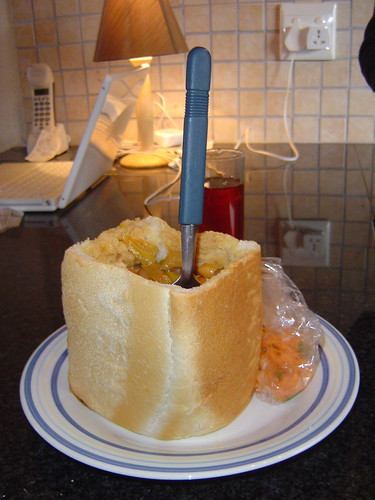
It's simply a loaf of bread that's been hollowed out and filled with curry.
When Katie visited the Apartheid Museum in Durban while I was out pretending to be a foreign correspondent one day, she learned that this delicacy was invented in that city at a time when Indian shop owners were not allowed to serve blacks. So the black people would go around the back, and the loaf of bread served as a to-go container in the dark era before both South African democracy and styrofoam.
That was one theory, anyway. The other was that the Indian golf caddies had to carry their lunches with them as they followed the rich white people around the golf course with their clubs. So they stored their lunch inside the bread.
That half loaf pictured above fed both Katie and me. It cost 10 rand. That's about $1.50.
It's fun to eat. See?
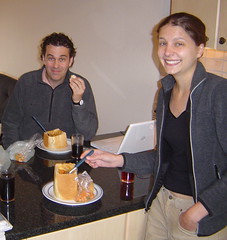
That's Rob's friend Tom with Katie. Rob and Tom stayed with us for one night, becoming the first people to try out the futon we've purchased to encourage you all to come and visit. Now that we've shared Bunny Chow with him, Tom is our friend too.
Rob's pictures from his visit are online here. Tom's are here. They were in South Africa for two weeks and saw more of the country than we have in three months.
One of those is Bunny Chow.
Never fear. No baby rabbits were harmed in the making of this dish. And it is not, as my friend Rob noted during his visit, the stage name for one of the waitresses at New York's legendary Lucky Cheng's.
Bunny Chow looks like this:

It's simply a loaf of bread that's been hollowed out and filled with curry.
When Katie visited the Apartheid Museum in Durban while I was out pretending to be a foreign correspondent one day, she learned that this delicacy was invented in that city at a time when Indian shop owners were not allowed to serve blacks. So the black people would go around the back, and the loaf of bread served as a to-go container in the dark era before both South African democracy and styrofoam.
That was one theory, anyway. The other was that the Indian golf caddies had to carry their lunches with them as they followed the rich white people around the golf course with their clubs. So they stored their lunch inside the bread.
That half loaf pictured above fed both Katie and me. It cost 10 rand. That's about $1.50.
It's fun to eat. See?

That's Rob's friend Tom with Katie. Rob and Tom stayed with us for one night, becoming the first people to try out the futon we've purchased to encourage you all to come and visit. Now that we've shared Bunny Chow with him, Tom is our friend too.
Rob's pictures from his visit are online here. Tom's are here. They were in South Africa for two weeks and saw more of the country than we have in three months.
Monday, June 06, 2005
Never Too Late To Be The Man
Oh my, was the Daily Voice in good form last week. We have a winner in both the headline category and the story category in the contest that I created unilaterally a few weeks ago.
The best story from last week requires a bit of delicate explanation regarding the practice of circumcision of men in some areas of South Africa. It's something that young men usually choose to do when they are about 16 or 17, and they aren't considered men until they've gone under the knife. There's no small amount of ritual involved, lots of time spent in a remote area in the bush with other young men going through the same thing, but usually no amount of anesthesia.
Oh, and the other thing you need to know is that “dagga” is the local word for pot.
So without further ado, here's the Voice story from last Thursday, which carried the headline “Never Too Late to Be the Man.”
It's good to be a man… even if you have to wait 58 years to become one, and spend most of those behind bars.
The dude says: “Manhood will change me. I am tired of being a boy. I have been left behind by young boys who have been circumcised.
“They have become men and now have homes and wives.”
So says 58-year-old Velile Ngxingo, a disability group pensioner.
The first thing Ngxingo wanted to do when he was released from jail on parole two weeks ago was to get circumcised and “become a man.”
Ngxingo says he has beeen in prison for a long time serving sentences for different crimes including housebreaking, theft and robbery.
He says: “I'm in and out of jail. I have been sentenced sometimes to six years, five years, two years, nine years and also 15 years.”
His most recent brush with the law resulted in his conviction and sentencing two years ago for possession of dagga in 2004.
On his release recently, Ngxingo prepared to go for initiation.
Even though he needed to be circumcised in hospital because of his age, his temporary home is an ibhoma in the bush.
…
Known as abekwetha to the Xhosa, boys who undergo the passage to manhood must spend up to three months in the bush and then have their foreskins sliced off, sometimes without safe medical procedure.
Ngxingo decided to go through with the procedure to encourage other people in a similar situation to follow the same path...
And here, for your further insight into all things South African, is my favorite headline from last week:
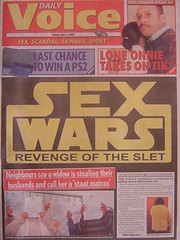
“Slet,” of course, means slut. And if you can't see it, the box in red says “Neighbours say a widow is stealing their husbands and call her a 'staat matras.'” In the story, it explains that this is an Afrikaans expression for a woman who sleeps with police officers, who are state employees. It means “state mattress.”
Lovely.
The best story from last week requires a bit of delicate explanation regarding the practice of circumcision of men in some areas of South Africa. It's something that young men usually choose to do when they are about 16 or 17, and they aren't considered men until they've gone under the knife. There's no small amount of ritual involved, lots of time spent in a remote area in the bush with other young men going through the same thing, but usually no amount of anesthesia.
Oh, and the other thing you need to know is that “dagga” is the local word for pot.
So without further ado, here's the Voice story from last Thursday, which carried the headline “Never Too Late to Be the Man.”
It's good to be a man… even if you have to wait 58 years to become one, and spend most of those behind bars.
The dude says: “Manhood will change me. I am tired of being a boy. I have been left behind by young boys who have been circumcised.
“They have become men and now have homes and wives.”
So says 58-year-old Velile Ngxingo, a disability group pensioner.
The first thing Ngxingo wanted to do when he was released from jail on parole two weeks ago was to get circumcised and “become a man.”
Ngxingo says he has beeen in prison for a long time serving sentences for different crimes including housebreaking, theft and robbery.
He says: “I'm in and out of jail. I have been sentenced sometimes to six years, five years, two years, nine years and also 15 years.”
His most recent brush with the law resulted in his conviction and sentencing two years ago for possession of dagga in 2004.
On his release recently, Ngxingo prepared to go for initiation.
Even though he needed to be circumcised in hospital because of his age, his temporary home is an ibhoma in the bush.
…
Known as abekwetha to the Xhosa, boys who undergo the passage to manhood must spend up to three months in the bush and then have their foreskins sliced off, sometimes without safe medical procedure.
Ngxingo decided to go through with the procedure to encourage other people in a similar situation to follow the same path...
And here, for your further insight into all things South African, is my favorite headline from last week:

“Slet,” of course, means slut. And if you can't see it, the box in red says “Neighbours say a widow is stealing their husbands and call her a 'staat matras.'” In the story, it explains that this is an Afrikaans expression for a woman who sleeps with police officers, who are state employees. It means “state mattress.”
Lovely.
Sunday, June 05, 2005
Pardon the Interruption
I was hoping that Katie would be the next one to put something up here, but she's got this thing about meeting her next deadline for her thesis. She says her schoolwork has to come before this website. I think this is what people call “being responsible,” though I wouldn't know from personal experience.
So a few quick updates, and then some real posts from me on Monday.
On the weather: After about five straight days of rain, today was clear, cloudless and beautiful. The temperature was crisp and pleasant. I can't tell you how hot it was, though, because I now have two temperature gauges, Fahrenheit and Celsius, and never the twain shall meet. All I know is, 20 degrees C is nice, 25 is fantastic, 30 means its time for sunblock, and anything above that is uncomfortable. Today, it was 22.
On the zebras: There's a website that explains the whole breeding project that's happening on the side of Table Mountain here. The zebras we keep seeing are apparently on their way to becoming Quaggas. Or, their kids will be Quaggas. Or maybe their grandkids. I dunno. Read the site.
Also, the word "zebra" apparently rhymes with "Deborah." Who knew?
On the phone company: We still don't have DSL. When we do, I'll put up a bunch of pictures from the protest I covered and some photos from our trips to the townships.
On the things we miss: As soon as Katie put up the list of things we missed from home, we had an invite from a new friend to come out and see a band, and it was in a place that made both Katie and I feel like we had been magically transported back to Brooklyn. With eyes wide, we stood there staring at the club, which belonged in the super-trendy Brooklyn neighborhood of Williamsburg, complete with Williamsburg's industrial decay, the too-cool hipsters and the local equivalent of Pabst Blue Ribbon beer. That same weekend, our friend Rob came through town, which cheered us up. And as soon as he left, a package he had mailed us from New York prior to his departure landed on our doorstep. Inside were a bunch of New Yorker magazines. I'm still craving bagels and Mexican food, but otherwise, we're okay.
So a few quick updates, and then some real posts from me on Monday.
On the weather: After about five straight days of rain, today was clear, cloudless and beautiful. The temperature was crisp and pleasant. I can't tell you how hot it was, though, because I now have two temperature gauges, Fahrenheit and Celsius, and never the twain shall meet. All I know is, 20 degrees C is nice, 25 is fantastic, 30 means its time for sunblock, and anything above that is uncomfortable. Today, it was 22.
On the zebras: There's a website that explains the whole breeding project that's happening on the side of Table Mountain here. The zebras we keep seeing are apparently on their way to becoming Quaggas. Or, their kids will be Quaggas. Or maybe their grandkids. I dunno. Read the site.
Also, the word "zebra" apparently rhymes with "Deborah." Who knew?
On the phone company: We still don't have DSL. When we do, I'll put up a bunch of pictures from the protest I covered and some photos from our trips to the townships.
On the things we miss: As soon as Katie put up the list of things we missed from home, we had an invite from a new friend to come out and see a band, and it was in a place that made both Katie and I feel like we had been magically transported back to Brooklyn. With eyes wide, we stood there staring at the club, which belonged in the super-trendy Brooklyn neighborhood of Williamsburg, complete with Williamsburg's industrial decay, the too-cool hipsters and the local equivalent of Pabst Blue Ribbon beer. That same weekend, our friend Rob came through town, which cheered us up. And as soon as he left, a package he had mailed us from New York prior to his departure landed on our doorstep. Inside were a bunch of New Yorker magazines. I'm still craving bagels and Mexican food, but otherwise, we're okay.
